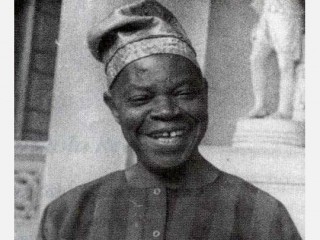
Amos Tutuola biography
Date of birth : 1920-06-20
Date of death : 1997-06-08
Birthplace : Abeokuta, Nigeria
Nationality : Nigerian
Category : Famous Figures
Last modified : 2010-11-26
Credited as : Writer, ,
The Nigerian writer Amos Tutuola is famous for his fantastic tales which, in their content, depend heavily on the folklore of his ancestral Yoruba people.
Amos Tutuola was born in Abeokuta (Yorubaland). His father's death in 1939 prevented him from pursuing his studies. During World War II he joined the Royal Air Force as a blacksmith, and when the war was over, he became a messenger in the labor department in Lagos.
As he enjoyed some reputation as a storyteller among his friends, Tutuola devoted the ample leisure afforded by his unexacting functions to penning in his own idiosyncratic brand of Nigerian English some of the bizarre tales which abound in Yoruba oral lore and which D. O. Fagunwa had recorded in his vernacular storybooks. The result was The Palmwine Drinkard and His Dead Palmwine Tapster in the Dead's Town (1952). The book was an immediate success.
While English and American reviewers were bewitched by Tutuola's exuberant imagination and his unconventional speech, Nigerian intellectuals were at first extremely hostile: they felt that his superstitious, "uncivilized" stories and his—in their view—uncouth, nonstandard English were likely to tarnish the image of Nigeria in the eyes of the outside world. Their criticism and contempt, however, did not detract Tutuola from quietly bringing forth other similar romances: My Life in the Bush of Ghosts (1954), Simbi and the Satyr of the Dark Jungle (1956), The Brave African Huntress (1958), The Feather Woman of the Jungle (1962), The Witch Herbalist of the Remote Town (1980), The Wild Hunter in the Bush of the Ghosts (1982) and Pauper, Brawler, Slanderer (1987).
Tutuola's recipe is of the simplest: the plucky hero or heroine embarks on an often perfunctorily motivated quest that leads him or her to the jungle forest and provides a framework for what really matters, an inexhaustible variety of adventures among gods and ghosts, ogres and pygmies, satyrs and magicians, and sundry other uncanny, Bosch-like monsters, such as the Smelling-Ghost, the Reverend Devil, the Television-handed Goddess, the Hairy Giant and a few "ghostesses, " all of whom experience no difficulty whatsoever in transforming themselves into almost any kind of mineral, vegetable, animal or even human shapes.
A comparison with collections of traditional tales shows that many of these episodes are part and parcel of Yoruba folklore, which is characterized by its familiarity with the supernatural, its prodigious inventive power, and its very peculiar sense of horror as a source of humor. But to the ancestral fund, Tutuola adds his own inimitable touch: he introduces elements of Christian and Western civilization which appear strangely exotic in this mythical world of African fantasy; above all, he solves to his own and his readers' satisfaction the linguistic problem of the African writer, coining new words, translating vernacular idioms, and generally distorting English vocabulary, syntax, and even spelling with impervious assurance and disarming efficiency.
In 1963 Tutuola had his revenge over his Nigerian highbrow critics when the popular actor-director-producer E. K. Ogunmola adapted The Palmwine Drinkard into a vernacular folk-opera, which was performed with tremendous success all over the country.
In addition to his writing, Tutuola has worked as a visiting research fellow to the University of Ife (1979) and as an associate to the international writing program at the University of Iowa (1983). His honors included being named an honorary citizen of New Orleans in 1983 and receiving second-place awards in Turin, Italy, in 1985 for The Palmwine Drinkard and My Life in the Bush of Ghosts.
Harold Reeves Collins, Amos Tutuola (1969), reviews Tutuola's work, traces its influence, and carefully assesses the author's place in Nigerian literature.
















